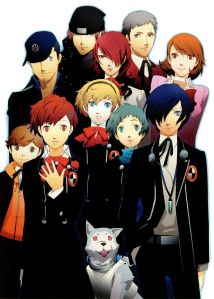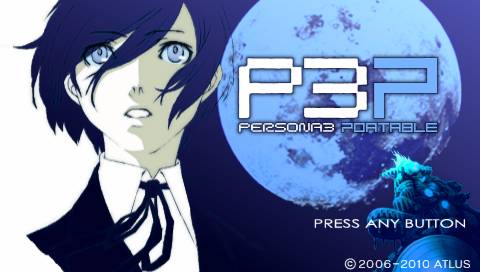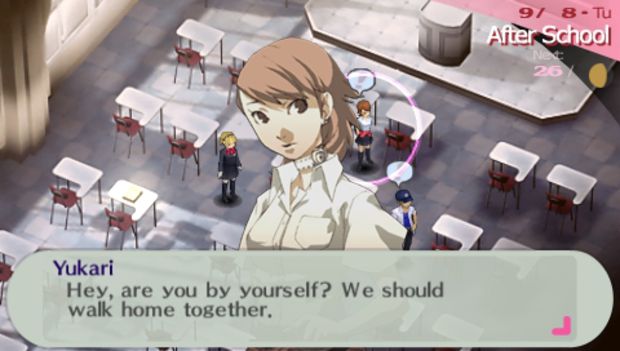Trying to make sense of my love for Persona 3
I look back on my experience playing Persona 3 and why it struck such chord with me. I try to break down the most important aspects of the game that had an strong effect on my experience.

(This article was first published on my personal blog lostinthezone.wordpress.com)
 Yesterday when I was browsing YouTube, I stumbled upon a wonderful upload of Persona 3's OST. "Oh sweet, I'm gonna have a listen" I thought, only to be wrestling with the feels 10 minutes later. The song was "Memories of You" ("Kimi no Kioku"). What the hell was going on?
Yesterday when I was browsing YouTube, I stumbled upon a wonderful upload of Persona 3's OST. "Oh sweet, I'm gonna have a listen" I thought, only to be wrestling with the feels 10 minutes later. The song was "Memories of You" ("Kimi no Kioku"). What the hell was going on?
Introducing Persona 3
What was so odd about Persona 3 is that thinking about it critically, there was a lot to like, but I never really thought of it as a great game in an objective sense. It's a quite unusual JRPG. There are weird quirks and jankiness, it's unintuitive to the Persona novice and there are probably many things its creators would want to reassess.
You assume the role of a transfer student in a Japanese city. You get to know fellow classmates and other people in the city. Persona 3 is really a game that's split into two aspects. In the first, you are free to explore a couple of different locales in the city (the mall, the school, a shrine, etc), chat with other people and engage deeper with a select number of characters. The special thing here is that this gameplay mode has a super imposed pace. Many of the available actions, such as going to the library to study, or watching a movie will have a time investment attached to it, and a day has predefined number of time windows where you can choose relatively freely what to do in it. The game takes place over the course of a whole year, and it really feels like time moves by as you progress in the game.
The second aspect is the dungeon crawl. Here is where Persona 3 takes the most from its parent franchise, the Shin Megami Tensei games. In most nights, you can choose to go to this dungeon named "Tartarus". This can only be done at midnight, where a supernatural 13th hour occurs. The dungeon crawl is relatively easy to grasp, as it's the typical turn based combat seen in many other JRPGs. There are some twists to the formula inherited from SMT, like the press turn system. Another aspect of this is that there is an element of a Pokemen-esque collecting meta game, where you obtain different creatures called personas that you can summon in battle, level up and build your battle strategy around. It's a really involved part of the game really and should appeal to those who've enjoyed this kind of gameplay. It's a real challenge to "catch 'em all".
The exploration and social aspect and the battle aspect are intertwined through the "social link" meta game. To get into this further isn't really important for this post. Just know that the two aspects aren't as disjointed as it might sound.
My experience with Persona 3 (Portable)

When I played Persona 3, I hadn't really played JRPGs in years. Apart from the occasional run through an older Final Fantasy entry I didn't know much about modern JRPGs. At some point I got a PSP. I was pretty new to handheld gaming and it was a little revelation. I could play a game for 30 minutes, put it on sleep and days later pick up exactly where I'd left off! When looking for games to get I couldn't get past the overwhelming recommendations for Persona 3 Portable. Immediately the art struck me as beautiful with a unusual style. This wasn't your old-school PS1 JRPG with chunky dialog boxes and spartan menus. Everything just oozed a certain attitude.
I wasn't used to playing huge lengthy JRPGs and at my age I just couldn't justify 6+ hour gaming binges in front of the TV or PC. I was more attracted to shortform games, especially new-age roguelikes like Spelunky or The Binding of Isaac. But with a handheld, I could slowly but surely make my way through a really involved game like Persona 3. I can't state enough that this shift, from static to mobile, makes a huge difference in how one engage with games. It actually opens up new genres and makes them more accessible in some cases.
All this came at a time where familial responsibilities became really big for me. Other changes in my life also meant that I essentially lost my own social circle. It was a pretty new experience. Even though I had my family with me, I felt incredibly isolated from the wider world. It was all about going home or going to work. This isn't to whine about my situation, but just to illustrate the stage in my life.
I finally beat Persona 3 late last year, and my time playing the game spanned almost three years. I would abandon the game for weeks at a time, pick it up again, and continue. I had two aborted starts and only on the third did I really stick with it. All in all, I spent a little over 100 hours with the game.
Looking critically at the game, I want to be quite frank. The story is good, but not as amazing as people often say it is. The events that transpire are suitably monumental and have weight. Pretty much all the characters are really well written and interesting to talk to. Especially the social links, when you get deeper in your relationship with a character over time, are engaging and for me are the main appeal of the game. Much like in real life, people have their own trials and tribulations, and learning about them causes the player to get emotionally invested. I really appreciated how grounded the issues where that occupied the minds of the other characters. It gives Persona 3 a distinct slice-of-life quality.
The battles are really fun actually. It's one of those things where you can space out and workout your mind on the calculations on the combat mechanics while listening to a podcast. It doesn't occupy the entire bandwidth of your mind. I never caught the bug of persona collecting, but it was still satisfying to unlock a new persona or a new skill.
Escapist fantasy in a familiar setting
I have a theory about Persona 3 and the franchise in general. I think its popularity in the West is rooted in a certain Japanophilia of my own(mid-20s) and later generations. I've enjoyed manga and anime when I was a teenager, and Japan always seemed like this exotic place. The mentality of the people, the weird customs and a different set of values were immediately interesting. I'm still in admiration of the stereotypical values of Japanese people, things like being really polite to the elderly and the hierarchy of seniority. Needless to say, there is a lot in Japanese media that probably isn't really authentic and designed to project a certain image to the wider world.
So like many people, I've harbored a dream of visiting Japan in the future. Persona 3 is a game that directly hits this nerve with me. I can really live my fantasy (well, only to a certain degree of course). The premise of being a high school student just makes this more potent. High school is a familiar setting, no matter if you live in a Western country or in Japan. The pattern of going to school, spending time in the city in your free time and going back to your dorm at night is something most have experienced and can easily identify with. Being set in Japan though, there is a freshness to it all, and exploration is inherently rewarding to a player like me who's already interested in the culture. Persona 3 is unapologetically Japanese, and that's its appeal.
The mundane and quiet is where the magic lies

Persona 3 could be described as yet another JRPG where a group of young heroes save the world from a big evil, but that would completely off the mark for me. To me, it's a game about the mundanity of life as a Japanese high schooler. Nevermind the supernatural overtones of the story. That can be compartmentalized in your mind for long swathes of the game. As I've gotten older, I've learned to appreciate the quiet moments in movies and other media. I want to direct you to a review of "Spirited Away" (a wonderful film directed by the great Hayao Miyazaki) written by Roger Ebert, but in particular this paragraph:
I think that helps explain why Miyazaki's films are more absorbing than the frantic action in a lot of American animation. "The people who make the movies are scared of silence" he said, "so they want to paper and plaster it over," he said. "They're worried that the audience will get bored. But just because it's 80 percent intense all the time doesn't mean the kids are going to bless you with their concentration. What really matters is the underlying emotions--that you never let go of those.
To me, the quiet moments of Persona 3 are the times when you come back to the dorm and see your friends hanging out in the lobby reading or talking with each other. When you walk Koromaru the dog in the evening, when you go grab a bite with Yukari after school. Most of these moments don't directly lead towards some greater event, especially since they're often interchangable with a number of other activities you could be doing, and there is a lot of repetition. To dismiss that as boring filler meant to stretch gameplay time would be wrong. Persona 3 is a very long game, yes, and in particular thanks to these quiet moments. But they all contribute to the emotion of experiencing the game. I've said that I spent roughly three years with this game on my PSP with a lot lengthy periods of leaving the game for other, more immediately rewarding games. At some point though, Persona 3 became part of the mood of the past three four years, a time when I was removed from my own, former social life.
The longer you spend time in this world, the more you get to know the characters in it. If you spent anywhere near as much time as I did, it'll feel like you've been with these characters for a while. It means that their character arcs have weight and importance, even though it's all relatively microscopic in the big picture. It sounds sad, but considering my personal situation over the last few years, Persona 3 did help me feel not so isolated. It's just a game and these characters are just fictional, yes, but that doesn't make the emotion any less real. All my favorite works of art, ranging from Final Fantasy 7 to the Harry Potter books to "Lost in Translation" and eventually Persona 3 have a way of carving out their own place in the emotional construct of my past.
Without the mundanity of the game and its length, Persona 3 wouldn't have occupied such a long period in my life and it wouldn't have become such a companion game.
A soundtrack with a willful personality
I'm not a fan of J-Pop. It's just not for me. I can appreciate the weirdness of choruses in Engrish, but it often feels like a lot of these songs are too intense, too saturated. Persona 3 has a J-Pop soundtrack, but with a much broader spectrum of influences. Shoji Meguro, the composer for Persona 3, included rock, dance and jazz influences into the soundtrack. It's a really unusual sound for a JRPG. It underlines the contemporary setting, and the youth of its main cast. But I first thought it's grating and looked for an option to turn off the music. But eventually you get used to it, it becomes just another quirk of Persona 3, and before long you hum along. When the game then hits the big story moments, the soundtrack really propels it further, and then it all comes together. Hearing "Burn my dread" when fighting the final battle was just unbelievable. It almost feels like the game gave the music context and meaning at select points.
I started this whole article because I was prompted to by a special song. "Memories of You" hits a nerve that only exists because I've completed the game. It's not purely about the end either (though it is partially), but it's more about the entirety of the experience. If you read the lyrics, it's the usual overly melodramatic flowery language seen in so many other J-Pop ballads. Only this time, after having played the game, it rings true. People often do spend important moments with their closest friends without appreciating it right then (and how could they?) and all that's left is the memory. It's hindsight that illuminates the importance of the special times in our lives, and there is an inherent tragedy to that, but also a sweetness.
Read more about:
BlogsAbout the Author(s)
You May Also Like







.jpeg?width=700&auto=webp&quality=80&disable=upscale)








